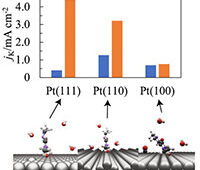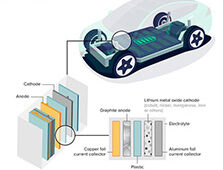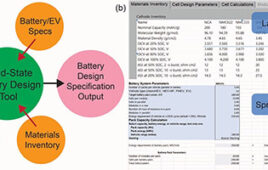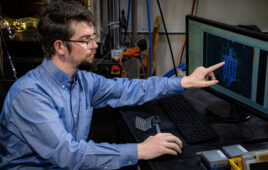Researchers at the Materials and Surface Science Institute (MSSI), Univ. of Limerick have made a significant breakthrough in the area of rechargeable battery technology. There is an ever-increasing demand for portable electronic devices, and improved technology for battery life and stability is a vital factor in device performance. The combined value of the market for rechargeable battery technology is set to grow from $11.8 billion in 2010 to $53.7 billion in 2020. The research team at UL have developed a technology that more than doubles the capacity of lithium-ion battery anodes and retains this high capacity even after being charged and discharged over 1000 times.
The research published by the journal Nano Letters outlines the findings. Lead researcher, Dr. Kevin Ryan explains; “We have developed a new germanium nanowire-based anode that has the ability to greatly increase the capacity and lifetimes of lithium-ion batteries. This breakthrough is important for mobile computing and telecoms but also for the emerging electric vehicle market allowing for smaller and lighter batteries that can hold more charge for longer and maintain this performance over the lifetime of the product.”
Ryan added; “The typical lithium-ion battery on the market today is based on graphite and has a relatively low capacity. This limits the amount of energy which can be stored. In our research we used an alternative element, germanium, which is of a higher-capacity. The challenge has been that the material expands quite dramatically during charging and falls apart after a relatively small number of cycles. By using nanotechnology, we have found a way to restructure germanium, in the form of nanowires, into a stable porous material that is an ideal battery material as it remains stable over very long time scales during continued operation.”
The research team have also ensured that their nanotechnology solution was scalable, low-cost and low-energy making the technology both greener and commercially viable.
The research was supported by Science Foundation Ireland (SFI) under the Principal Investigator Program to Dr Kevin Ryan and also by EU funding through the GREENLION Project. The GREENLION project is a large scale collaborative project within the FP7 framework with the goal of manufacturing greener and cheaper lithium-ion batteries for electric vehicle applications. More details can be found on the group’s website http://www.nanoresearchul.org.
Source: Univ. of Limerick, Ireland




